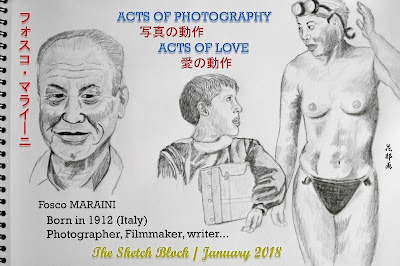 The
publication of this book celebrates the first American exhibition of Fosco
Maraini ‘s photographs, held at the Tenri Gallery in New York City, April throught June of 1999.
The
publication of this book celebrates the first American exhibition of Fosco
Maraini ‘s photographs, held at the Tenri Gallery in New York City, April throught June of 1999.
The
publication of this book, as well as the exhibition and the film about Maraini,
Silently Drawn, could not have been possible without the extraordinary
assistance of many people, for many different reasons. […] John Bigelow Taylor,
Diane Dubler, April 1999
MARAINI -
Acts of Photography Acts of Love, Joost Elffers Book, 168 pages, 1999.
Maraini on Maraini
Excerpts from Bagueria
By Dacia Maraini
 |
| (1912 - 2004) |
There was a
certain reserve between my father and me, something never put into words, which
left its mark on our relationship as ‘mates’ » : this had been initiated
by him as if there were no differences of age between us, as if one Saturday
morning we might together come to a decision to go for a six-hour excursion
into the mountains, or go out rowing in the sun for four hours, or for an
hour’s swim in the icy cold water of the river.
A warning should
have been enough and sometimes it was. But even when I imagined my strength to
be greater than it was, I would fling myself forward and do my best to keep up
with him. Once my mother gave him a slap. He did not return it. He had brought
me back from a trip into the mountains, which had lasted seven hours in the
frost, and I had a high temperature and lips that had turned violet, and my
feet were quite frozen.
But another
time I saved his life. He had to leave early in the morning for a trip into the
mountains with some friends. I was ill, I seemed to be delirious. He told his
friends to go ahead and he would join them the next day. They went off and were
swept away by an avalanche and were all killed.
Between us
there was above all a sense of solidarity, a comradeship, a bold independence,
an exciting defiance of rules of ordinary common sense. Like two travelling
companions, two sportsmen, two friends for life, we could communicate with each
other by a look. Words got in the way, and in fact we spoke little. With me he
laughed, played, ran. We were earnest explorers and we got to know the tracks
in the middle of the forest. We paddled up the rivers, we faced the perils of
the sea but he did not speak; lest words create something limiting and commonplace
– at least, if they were spoken out loud; only thought was considered ‘noble’.
Indeed he wrote, just as his mother used to write – my grandmother, the very
beautiful Yoi, half English and half Polish, with whom so many men of her time
had fallen in love. It was acceptable to write rather than to talk. This was
the silent commandment, never articulated, that was in force between us. I
obeyed the rules. But how was I to make use
of the love I felt? To write what?
My father’s
books are those of a scientist and he never ceased to write about ethnology, a
science poised between the humanism of antiquity and new technology, which he
loved more than anything else, a way of writing that consists of observation
and analysis and at the same time is both invention and narration. But I chose
pure story telling, beyond any scientific pretensions unless it was the science
of writing itself. I began by writing poetry that was all about him. And then,
with a struggle, my gaze shifted to other faces, other smells, the backs of
other necks, other smiles. But with what reluctance! Almost as if the world
consisted only of his swaying yet resolute walk, his embarrassed cough, his
departure at dawn for a distant future, far away and unknown yet absolutely
wonderful.
[…] I never
asked my father anything about writing. It seemed to me that his mere presence,
sitting at the table with his back facing the door (which he always insisted
must be kept shut), his obstinate insistence on silence, was itself an
affirmation of his seriousness and professional discipline.
[…] He was
forever on his travels, forever far away. I transformed my longing into an
intricate, airy architecture, into the mirage of a city and the desire to dream
with open eyes. Whenever he came back from one of his journeys I took
meticulous note of the smells he brought back with him, the smell of apples
(why does the inside of haversacks always have strong, musty underlying smell
of apples?), of dirty washing, of hair warmed by the sun, of crumpled books,
dry bread, old shoes, withered flowers, tobacco, and tiger balsam against
rheumatism. […]
Drawings : Catherine Pulleiro



Aucun commentaire:
Enregistrer un commentaire